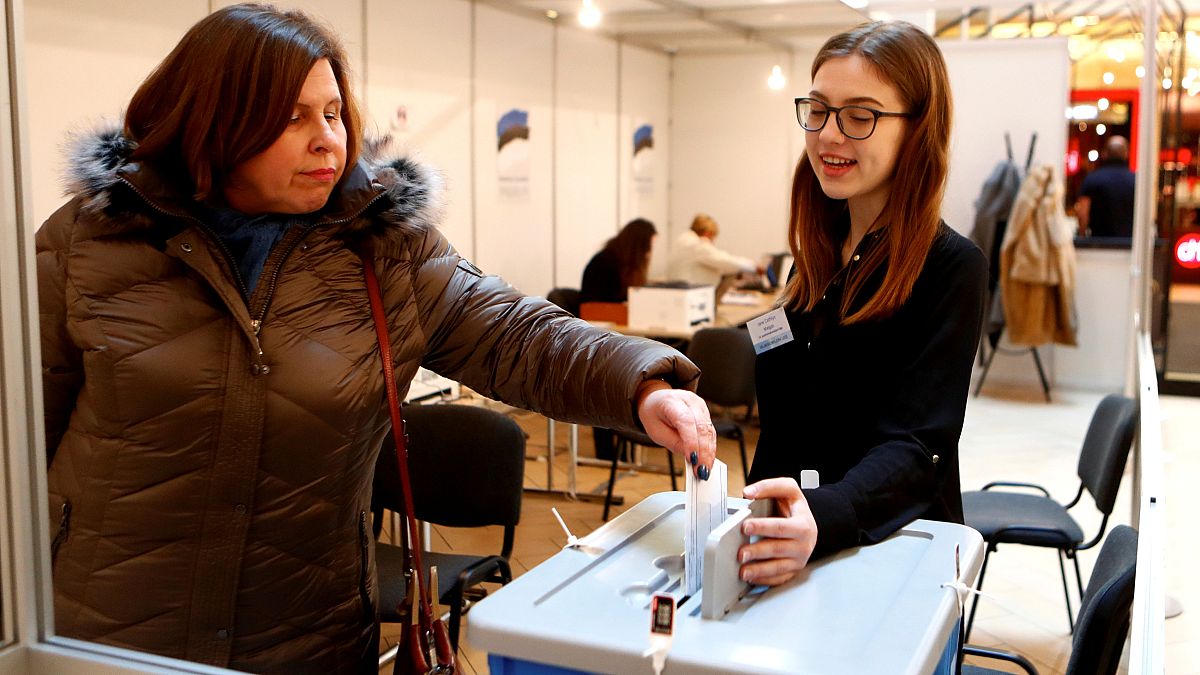Estonians voters elect a new Parliament on Sunday as surveys show a surge of far-right party EKRE.
Estonians are heading to the polls on Sunday (March 3) as the ruling centre-left coalition and its traditional liberal rival face an unexpected challenger: a far-right party boosted by a backlash from mostly rural regions.
In final surveys conducted by Kantar Emor based on advance voting, Prime Minister Juri Ratas's centrist Centre party received 22.3 per cent support, trailing the liberal Reform party led by former MEP Kaja Kallas just below 30 per cent.
Meanwhile, the far-right Conservative People's Party of Estonia (EKRE) received 13.4 per cent support in the advance voting survey, but up to 23.8% among those planning to go vote on Sunday.
With 5-6 parties expected to enter the 101-seat parliament, the splintered outcome will likely make coalition building tricky.
Traditional rivals, Centre and Reform have alternated in government and even governed together over the nearly three decades since Estonia broke free from the crumbling Soviet Union.
Both strongly support EU and NATO membership and have favoured austerity to keep spending in check, giving Estonia the eurozone's lowest debt-to-GDP ratio.
Centre has vowed to replace Estonia's 20 per cent flat income tax and 21 per cent corporate tax with a progressive system to boost state revenue. Reform wants to raise the tax-free monthly minimum and lower unemployment insurance premiums to aid job creation.
Joblessness hovers at just under five per cent while economic growth is expected to slow to 2.7 per cent this year, from the 3.5 per cent in 2018.
Eurosceptic party on course to capture second or third spot
While it won only seven seats in parliament in the 2015 election, the EKRE is set to capture a close third spot behind established parties -- with some surveys even placing it in the second position.
Staunchly eurosceptic, it called for an "Estxit" referendum on Estonia's EU membership, although the move would fail in the overwhelmingly pro-EU country.
The party's deep suspicion towards Moscow means it sees NATO membership as a must and fully supports the multinational NATO battalion installed in Estonia in 2017 as a tripwire against possible Russian adventurism.
"The rise of the populist radical right is reshaping the political landscape across Europe and Estonia is no exception," wrote Kristi Raik,Director of the Estonian Foreign Policy Institute.
The scholar noted EKRE’s policies fit a pattern now familiar from elsewhere on the continent: the defence of conservative family values, fears of migration, and attacks on Europe's liberal elite.
According to Mari-Liis Jakobson, a Tallinn University political sociologist, it remains unclear whether "mainstream parties will form a 'cordon sanitaire' around the more radical EKRE."
Russia's influence
The Centre party has long been the favourite of Estonia's Russian minority, which accounts for around a quarter of the Baltic state's population of 1.3 million.
In 2004, the party signed a memorandum of understanding with Russian President Vladimir Putin's United Russia party.
But since becoming party leader in 2016, Juri Ratas insists the deal is "frozen" in order to avoid losing voters suspicious of Soviet-era master Russia, especially after its 2014 annexation of Crimea from Ukraine.
The Russian minority is counting on Centre to save the current education system with both Estonian and Russian-language schools created during Soviet times, while Reform and EKRE want an end to Russian-language instruction.
A record number of online voters
Estonia is a pioneer when it comes to online voting -- in 2005, it became the first country in the world to use it for a national election.
As a result, more than a quarter of voters have already cast their ballot ahead of Sunday's election via a dedicated government website.
Candidates have been trained to secure their home pages in case of hacking and Estonian authorities closely track fake news and disinformation.
Estonia's electoral committee has so far reported no attempts from Russia or elsewhere to interfere with the election, either through hacking, fake news or disinformation.
Officials are confident the country's online voting system can withstand any attempted meddling.
